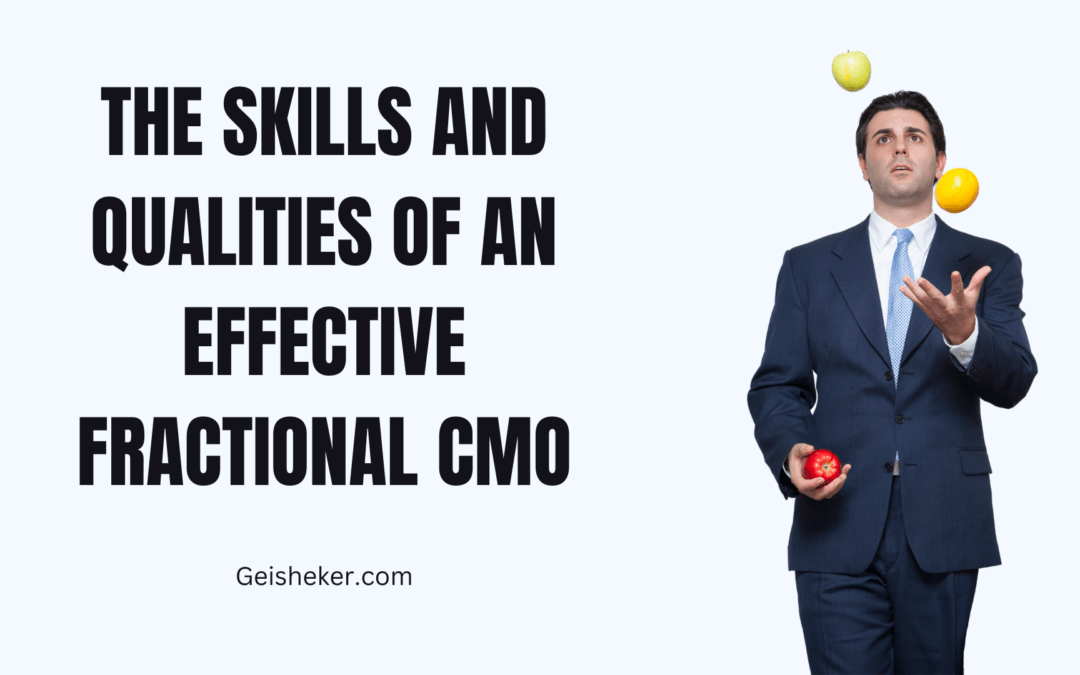The Role of the Fractional CMO
The fractional Chief Marketing Officer (CMO) is critical in providing strategic marketing leadership and direction to companies on a part-time, project, or interim basis. Unlike a full-time CMO, a fractional CMO offers the benefit of senior-level marketing expertise without the high cost of a permanent senior executive. Companies utilize fractional CMOs to fill gaps in marketing skills, band-aid challenging situations, or assist during periods of transition and change.
In the role of fractional CMO, marketing leaders must quickly assess business situations, identify opportunities to add value and execute strategic plans to capitalize on these opportunities. The most effective fractional CMOs exhibit diverse competencies that enable them to drive impact regardless of the specifics of the business context. As we explore the keys to success in the fractional CMO role, we will highlight six core competency areas: strategic orientation, marketing fundamentals, leadership ability, change management, communication skills, and business acumen.
1.Strategic Orientation
The most effective fractional CMOs think strategically. They understand how to develop marketing strategies and plans that align with overarching business goals and objectives. Essential skills and qualities in strategic orientation include:
- Sharp analytical abilities to deeply understand market landscapes, trends, opportunities, and challenges. Able to synthesize complex information into strategic insights.
- Adept at setting short and long-term visions for marketing activities. Excels at defining qualitative and quantifiable objectives that ladder up to financial targets.
- Exceptional strategic planning skills. Can create integrated plans across all elements of marketing mix to drive brand, customer acquisition, market share, and revenue outcomes.
- Strong capability to course-correct strategies based on data and analytics. Continually optimizes ongoing strategic plans based on real-time monitoring of effectiveness.
By exhibiting strengths in strategic orientation, fractional marketing leaders provide the vision and direction needed to guide impactful marketing programs. They understand not just marketing tactics but how to develop and execute comprehensive strategies that deliver results.
2. Core Marketing Fundamentals
Beyond strategic abilities, the best fractional CMOs firmly grasp core marketing fundamentals. They possess the functional knowledge and skills to orchestrate various marketing activities across both digital and traditional domains. Key marketing fundamentals fractional CMOs must command include:
- Product marketing – Defining product value propositions. Developing pricing strategies. Guiding product enhancements and innovation pipelines based on customer needs, competitive offerings, and market trends.
- Promotions – Designing campaigns across paid, earned, shared, and owned channels. Executing integrated programs encompassing advertising, events, PR, incentives, and partnerships.
- Digital marketing – Implementing effective inbound marketing techniques, including SEO, content marketing, and social media. Leveraging customer data and analytics to optimize conversion funnels.
- Brand-building – Stewarding and advancing brands through compelling positioning and messaging. Ensuring consistency across touchpoints. Monitoring branding KPIs, including awareness, perception, and engagement.
By maintaining core functional expertise across key marketing facets, fractional CMOs can lead various marketing initiatives with confidence and authority. This hands-on knowledge enables them to roll up their sleeves and make an immediate impact.
3. Strong Leadership Ability
Fractional marketing executives must lead horizontal teams cross-functionally to deliver significant marketing programs. Strong leadership skills are essential. Key attributes include:
- Inspiring and motivating – Sets a visionary tone and brings energy to teams. Connects marketing objectives to big-picture corporate goals to foster engagement.
- Collaborative orientation – Inclusively involves colleagues and stakeholders in shaping plans—Elicits buy-in across the organization.
- Empowering management style – Provides direction but gives team autonomy and ownership to build accountability. Supports professional growth.
- Leading by influence – Persuades others to adopt recommendations and ideas through logic and the presentation of data/facts. Effectively customizes messages to appeal to different internal audiences.
By motivating colleagues through an engaging presence and purpose, fractional CMOs build the unified commitment across teams needed to deliver impactful marketing programs.
4. Change Management Capabilities
Fractional CMO engagements frequently involve organizational change – introducing new strategies, processes, technologies, or cultural shifts to elevate marketing performance. Skillet in change management techniques enables effective fractional CMOs to steer enterprises through significant flux and transition periods. Change management competencies include:
- Change advocacy – Making a compelling case for “why change” backed by facts and figures. Framing the risks of the status quo and the benefits of a new strategic direction.
- Stakeholder mapping – Documenting which changes will impact internal players. Segmenting them by level of support/opposition to guide communications and influence campaigns.
- Change adoption road mapping – Defining critical milestones over the transformation timeline. Detailing how behaviors must evolve across marketing and connected groups to meet objectives.
- Reinforcement systems – Ensuring changes stick through new processes, training programs, and personnel performance criteria. Institutionalizing changes into “the way we do marketing” at the company.
Savvy change management elevates a fractional CMO’s ability to drive strategic shifts that may be critical to unlocking improved marketing effectiveness but disruptive in the short term. Companies seek out fractional executives with this expertise to guide significant marketing transformations.
5. Strong Communication Skills
Strategies and plans are only as effective as their execution. Fractional CMOs must communicate effectively across a broad spectrum of internal and external stakeholders to successfully implement marketing programs. Strong communication skills include:
- Executive presence – Conveying credibility and authority when presenting to senior leadership teams, board members, and partners. Customizing style and message accordingly.
- Active listening – Giving full attention to colleagues and subordinates. Suspending judgment to understand circumstances from their perspectives before responding.
- Clear writing – Authoring detailed and logical emails, memos, reports, and presentations tailored to various audiences. Exhibiting precision with language and copyediting solid abilities.
- Public speaking – Sharing messages persuasively with both large and small groups. Tailoring talks strategically for specific audiences.
Through solid communication tactics, fractional CMOs understand marketing strategies across organizations, constructively debate alternate approaches, obtain buy-in on plans, and drive effective execution by cross-functional teams.
6. Keen Business Acumen
Though explicitly focused on marketing, the most successful fractional CMOs maintain keen business acumen spanning beyond their core functional domain. Critical facets of strong business judgment include:
- Financial analysis – Modeling P&L impacts of marketing investments. Conducting ROI analyses across initiatives. Translating marketing results into revenue and profit outcomes.
- Operations insights – Understanding sales, product, and technology processes. Identifying operational barriers to effective marketing program deployment and areas for enterprise process improvement.
- Industry awareness – Tracking market, competitive, and consumer trends. Identifying new customer needs, product innovations, competitive responses, and disruptive forces that should shape strategies.
- Analytical orientation – Constantly reviewing metrics. Asking questions when data varies from expectations. Using insights to optimize ongoing plans and strategies.
By maintaining strong general business analysis skills and adopting a holistic view of organizational challenges and opportunities, fractional CMOs make recommendations and steer strategies accounting for a complete 360-degree perspective across all facets of company operations.
Key Takeaways
The growing strategic influence of marketing across corporations and the increasing complexity and pace of change in the marketplace have fueled the rise of elite fractional marketing executives.
Leading fractional CMOs exhibit profound strengths across core competency areas, including strategic orientation, marketing fundamentals, leadership, change management communication, and business acumen. This diverse blend of soft and hard skills enables the most accomplished fractional CMOs to drive transformational impact regardless of client situations. For enterprises seeking interim marketing leadership during critical periods of transition, growth, or turnaround, fractional CMOs with demonstrated excellence across all dimensions represent the gold standard.
Hire a Leading B2B SaaS Fractional CMO
If your company needs a B2B SaaS fractional CMO, consider working with Peter Geisheker. Peter has been providing Fractional CMO services for over 20 years and has expertise in growth tactics and conversion optimization. View Peter’s Fractional CMO case studies.


